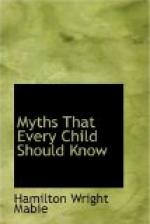We speak of “the siren voice of pleasure,” “the blow of fate,” “the smile of fortune,” and do not remember, often do not know, that we are recalling that remote past when people believed that there were Sirens on the coast of Crete whose voices were so sweet that sailors could not resist them and were drawn on to the rocks and drowned; that fate was a terrible, relentless, passionless person with supreme power over gods and men; that fortune was a being who smiled or frowned as men smile or frown, but whose smile meant prosperity and her frown disaster.
There are few poems which have interested children more than Robert Browning’s “Pied Piper of Hamelin.” The story runs that long ago, in the year 1284, the old German town of Hamelin was so overrun with rats that there was no peace for the people living in it. When things were at their worst a strange man appeared in the place and offered, for a sum of money, to clear it of these pests. The bargain was made and the stranger began to pipe; and straightway, from every nook and corner in the old town, the rats came in swarms, followed him to the river Weser and jumped in and were drowned.
When the people found that the city was really free from rats they were ungrateful enough to say that the piper had used magic, which was believed to be the practice of the evil spirit, and refused to carry out their part of the contract. The stranger went off in a great rage and threatened to come back again and take payment in his own way. On St. John’s Day, which was a time of great festivity, he suddenly reappeared, blew a new and beguiling air on his pipe, and immediately every child in the city felt as if a hand had seized him and ran pell-mell after the musician as he climbed the mountain, in which a door suddenly opened, and through that door all, save a lame boy, passed and were never seen again.
From this old story probably came the proverb about paying the piper; and it is one of many stories which turn on the magical power of a voice or a sound to draw men, women, and children to their doom. These very interesting stories are not like the stories which are made up just to please people and help them pass away the time; they are different forms of one story—the story of the wind, told by people who thought that the wind was not what we call a force but a person, and that when he called those who heard must follow if he chose; for “the piper is no other than the wind, and the ancients held that in the wind were the souls of the dead.”
If every time we think of a force we should think of a person, we should see the world as the men and women who made the myths saw it. Everything that moved, or made a sound, or flashed out light, or gave out heat was a person to them; they could not think of the wind rushing through the trees or the storm devastating the fields without out imagining someone like themselves, only more powerful, behind the uproar and destruction, any more than we can see a lantern moving along the road at night without thinking instinctively that somebody is carrying it.




